| Listing 1 - 10 of 13 | << page >> |
Sort by
|
Book
Year: 1966 Publisher: Paris: Nizet,
Abstract | Keywords | Export | Availability | Bookmark
 Loading...
Loading...Choose an application
- Reference Manager
- EndNote
- RefWorks (Direct export to RefWorks)
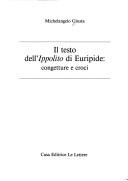
ISBN: 8871663705 Year: 1998 Publisher: Firenze Le lettere
Abstract | Keywords | Export | Availability | Bookmark
 Loading...
Loading...Choose an application
- Reference Manager
- EndNote
- RefWorks (Direct export to RefWorks)
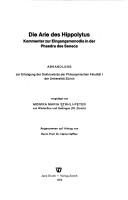
ISBN: 3260037640 Year: 1974 Publisher: Zürich : Juris-Verlag,
Abstract | Keywords | Export | Availability | Bookmark
 Loading...
Loading...Choose an application
- Reference Manager
- EndNote
- RefWorks (Direct export to RefWorks)
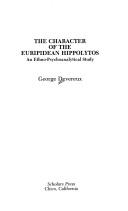
ISBN: 0891307893 Year: 1985 Publisher: Chico Scholars press
Abstract | Keywords | Export | Availability | Bookmark
 Loading...
Loading...Choose an application
- Reference Manager
- EndNote
- RefWorks (Direct export to RefWorks)
Hippolytus (Greek mythology) in literature --- Sex in literature --- Tragedy --- Psychoanalysis and literature --- -Literature and psychoanalysis --- Psychoanalytic literary criticism --- Literature --- Drama --- Euripides --- -Euripides --- Euripide --- -Drama --- Literature and psychoanalysis --- Euripides.
Book
Year: 1954 Publisher: Paris : Librairie Nizet,
Abstract | Keywords | Export | Availability | Bookmark
 Loading...
Loading...Choose an application
- Reference Manager
- EndNote
- RefWorks (Direct export to RefWorks)
Book
Year: 1969 Publisher: Erlangen-Nürnberg : Philosophische Fakultät der Friedrich-Alexander-Universität,
Abstract | Keywords | Export | Availability | Bookmark
 Loading...
Loading...Choose an application
- Reference Manager
- EndNote
- RefWorks (Direct export to RefWorks)
Book
ISBN: 1282904256 9786612904257 0822381796 Year: 1993 Publisher: Durham, N.C. : Duke University Press,
Abstract | Keywords | Export | Availability | Bookmark
 Loading...
Loading...Choose an application
- Reference Manager
- EndNote
- RefWorks (Direct export to RefWorks)
Where is the pleasure in tragedy? This question, how suffering and sorrow become the stuff of aesthetic delight, is at the center of Charles Segal's new book, which collects and expands his recent explorations of Euripides' art. Alcestis, Hippolytus, and Hecuba, the three early plays interpreted here, are linked by common themes of violence, death, lamentation and mourning, and by their implicit definitions of male and female roles. Segal shows how these plays draw on ancient traditions of poetic and ritual commemoration, particularly epic song, and at the same time refashion these traditions
Hippolytus (Greek mythology) in literature. --- Hecuba (Legendary character) in literature. --- Alcestis (Greek mythology) in literature. --- Trojan War --- Sex role in literature. --- Grief in literature. --- Tragedy. --- Literature and the war. --- Euripides --- Euripides. --- Criticism and interpretation.
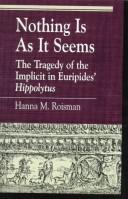
ISBN: 0847690938 084769092X Year: 1999 Volume: *6 Publisher: Totowa Rowman & Littlefield
Abstract | Keywords | Export | Availability | Bookmark
 Loading...
Loading...Choose an application
- Reference Manager
- EndNote
- RefWorks (Direct export to RefWorks)
Hippolyte (Mythologie grecque) dans la littérature --- Hippolytus (Greek mythology) in literature --- Hippolytus (Griekse mythologie) in de literatuur --- Phaedra (Greek mythology) in literature --- Phaedra (Griekse mythologie) in de literatuur --- Phèdre (Mythologie grecque) dans la littérature --- Tragedie --- Tragedy --- Tragédie --- Treurspel --- Greek drama (Tragedy) --- Hippolytus (Greek mythology) in literature. --- Phaedra (Greek mythology) in literature. --- Tragédie grecque --- History and criticism --- Histoire et critique --- Euripides. --- Tragedy. --- Tragédie grecque --- Hippolyte (Mythologie grecque) dans la littérature --- Phèdre (Mythologie grecque) dans la littérature --- Drama --- Euripides
Book
ISBN: 0801835305 Year: 1987 Publisher: Baltimore (Md.) : Johns Hopkins university press,
Abstract | Keywords | Export | Availability | Bookmark
 Loading...
Loading...Choose an application
- Reference Manager
- EndNote
- RefWorks (Direct export to RefWorks)
875 EURIPIDES --- Hecuba (Legendary character) in literature --- Heroes in literature --- Hippolytus (Greek mythology) in literature --- Queens in literature --- Tragedy --- Trojan War --- -Mythology, Greek --- Drama --- Griekse literatuur--EURIPIDES --- Literature and the war --- Euripides --- Troy (Extinct city) --- -In literature --- Hecuba (Legendary character) in literature. --- Heroes in literature. --- Hippolytus (Greek mythology) in literature. --- Queens in literature. --- Tragedy. --- Literature and the war. --- -Griekse literatuur--EURIPIDES --- 875 EURIPIDES Griekse literatuur--EURIPIDES --- Euripide --- -Drama --- Mythology, Greek --- -875 EURIPIDES Griekse literatuur--EURIPIDES --- Euripides. --- In literature.
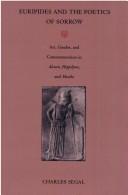
ISBN: 9780822313601 082231360X Year: 1993 Publisher: Durham Duke university press
Abstract | Keywords | Export | Availability | Bookmark
 Loading...
Loading...Choose an application
- Reference Manager
- EndNote
- RefWorks (Direct export to RefWorks)
Hippolytus (Greek mythology) in literature. --- Hecuba (Legendary character) in literature. --- Alcestis (Greek mythology) in literature. --- Trojan War --- Sex role in literature. --- Grief in literature. --- Tragedy. --- Literature and the war. --- Euripides --- Criticism and interpretation. --- Alcestis (Greek mythology) in literature --- Grief in literature --- Hecuba (Legendary character) in literature --- Hippolytus (Greek mythology) in literature --- Sex role in literature --- Tragedy --- Drama --- Literature and the war --- Euripide (0480-0406-av.-J.-C.) --- Chagrin --- Rôle selon le sexe --- Critique et interprétation --- Dans la littérature --- Rôle selon le sexe --- Critique et interprétation --- Dans la littérature
| Listing 1 - 10 of 13 | << page >> |
Sort by
|

 Search
Search Feedback
Feedback About UniCat
About UniCat  Help
Help News
News